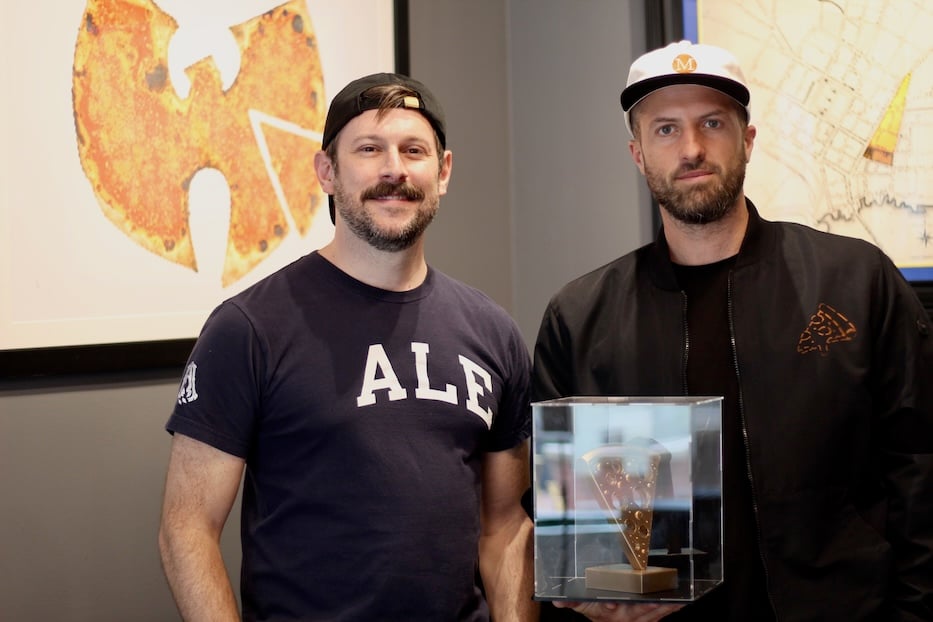
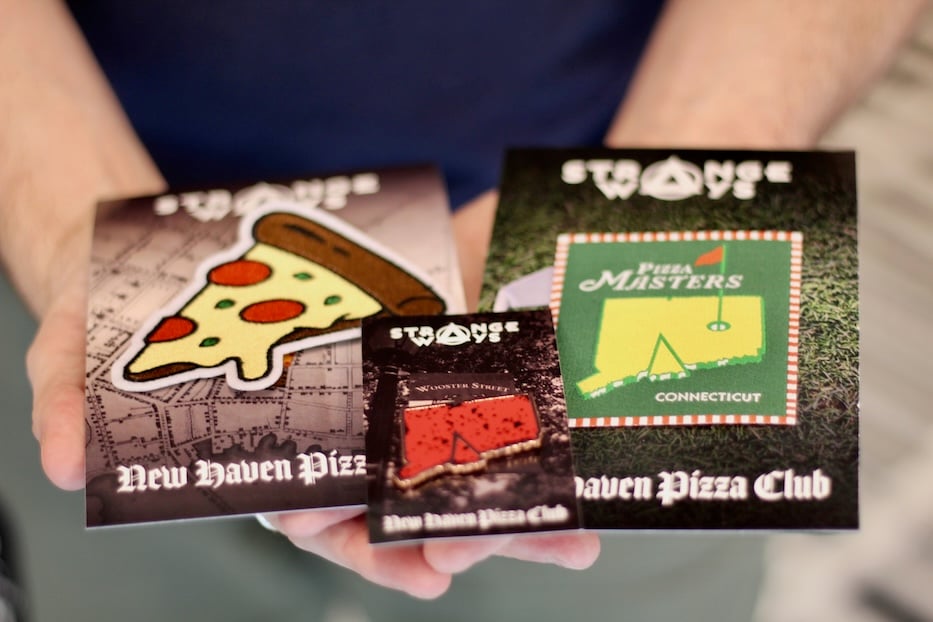
Strange Ways Owner Alex Dakoulas and New Haven Pizza Club Founder Michael Pollack. "The pizza is the art," Dakoulas said. Lucy Gellman Photos.
The slice stands out immediately, its white edges cutting through an expanse of cyan. There’s the crust, the clean-cut edge, the neat circles where toppings might otherwise be. Around it, white scribbles bloom across the page, some of them barely legible. A few feet away, a larger-than-life, red slice of pizza looks back, its underside speckled with a delicate pattern of char.
The pieces, by artist Michael Pollack, mark a new collaboration between Strange Ways and New Haven Pizza Club, of which Pollack is the 2024 founder. This month, he and Strange Ways owner Alex Dakoulas have rolled out a pizza-themed collaboration, from an exhibition at the store’s downtown studio to a trio of pins and patches that celebrate New Haven’s place as the pizza capital of the United States.
The exhibition closes May 31; the pins and patches will remain available in the store and online. Both launched earlier this month, at a jam-packed New Haven Night Market.
“I’m trying to get people off their phones and reengaged in life,” said Pollack, who launched New Haven Pizza Club from District in the fall of last year. “I like to express things through a creative lens, and I know that pizza will draw them in. In New Haven, when someone brings up pizza, you’re like ‘What? What did you say?’”
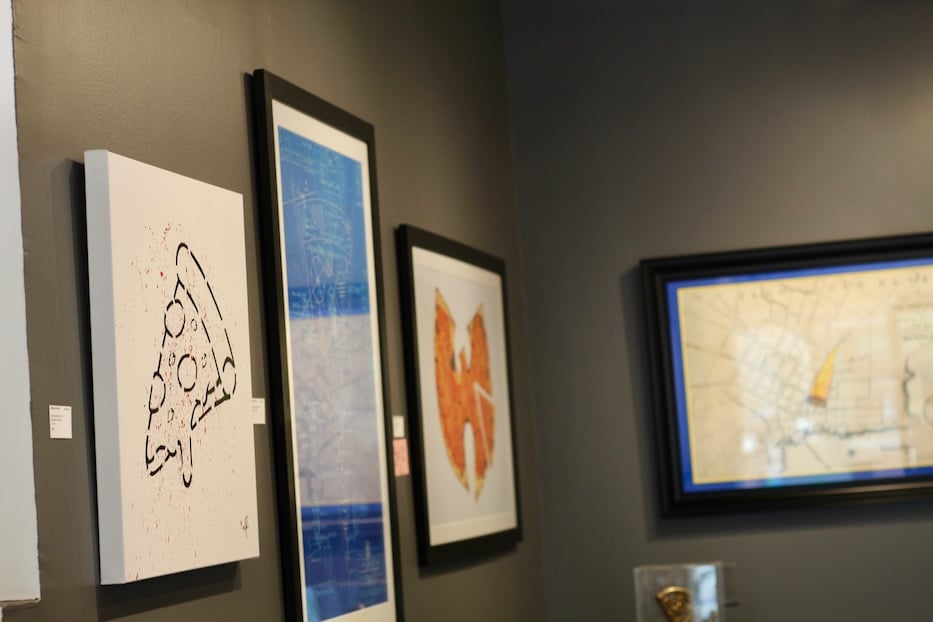
The idea for the collaboration took root several months ago, when Dakoulas “saw what he [Pollack] was doing,” and thought it was interesting. As a former resident of Wooster Square and business owner at the edge of downtown, he’s watched a growing interest in pizza tourism in New Haven, where the right amount of char and toppings can quickly turn political.
On any given day that the shop is open—the storefront sits just off Pitkin Plaza—it’s not uncommon for people to walk in and ask if there’s a pizza-themed memento they can bring home with them. In this sense, Pollack felt like a natural collaborator: he has focused on keeping the New Haven Pizza Club brand local, including partnerships with small businesses like Tyco, Modern Apizza, and Armada Brewing and large ones like Tweed Airport.
Dakoulas is also no stranger to collaboration: for years, he’s worked with local artists both in and well beyond the shop. Strange Ways is filled with pins and patches that have been designed specifically for the store’s collection, a mix of kitsch, funky, punk, hygge and progressive that extend to t-shirts, posters, and all make and manner of cards and stickers. The exhibition and gallery space, which will host a Pride-themed community exhibition in June, was the final piece to a creative sort of puzzle at the store.
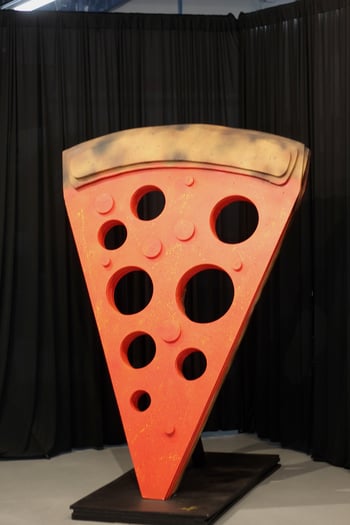
“I wanted this space to be utilized more,” Dakoulas said of the studio, standing beneath an image of pizza that now adorns the front entrance. “It’s just very tied into what Strange Ways is about. All of our work comes from independent artists and small brands, and I felt like his work was very fitting.”
“Galleries can be stuffy,” he added. The studio space is meant to reject that. “The pizza is the art.”
A viewer sees that from the moment they walk into the shop, where Pollack has installed a tidy gallery of pizza art on the right side of the entrance ramp. On a wall close to the front door, photographs of the “Holy Trinity” of New Haven pie (Sally’s, Frank Pepe’s, and Modern Apizza) peek out, bringing a viewer right in. Just a foot or so away, a black-and-white sign that reads “I only eat pizza from New Haven” doubles as a sort of de facto exhibition text.
There’s something very pop art about these works, like Pollack has entered a commentary on commodity, branding, and mass production whether he has wanted to or not (a giant pizza sculpture across the room, complete with a charred base, furthers this approach).
There is, for instance, a Wu-Tang inspired pie from the State Street restaurant Nolo, itself a symbol of a symbol made for layers of human consumption. Or an old map of New Haven, in which Pollack has outlined a thin, red-and-yellow piece of pizza between State and Olive Streets, turning early urban planning into a whimsical moment of culinary hide-and-seek.
“I like to break it down to the true form,” Pollack said when discussing the “Holy Trinity” series as the entry point to the show. “Here, we lean into the purity of pizza—the char, the crisp, the undercarriage, the sauce.”
It’s just the first bite, though. In two Banksy-inspired canvases, slices of pizza hover in midair, pulling a viewer’s attention to the center of the image. In one, a slice is black and white, speckled with a graffiti-esque spray of red that extends beyond its cheesy edges. In another, a green-and-blue slice floats where the planet would otherwise be, a thick, turquoise drip of cheese spilling from one side.
In the darkness that surrounds it, stars criss-cross the black expanse. It’s the milky way, but pizza has replaced our planet as we know it. If there were any ambiguity (there is not), it’s Pollack’s reminder that this is the center of his universe.
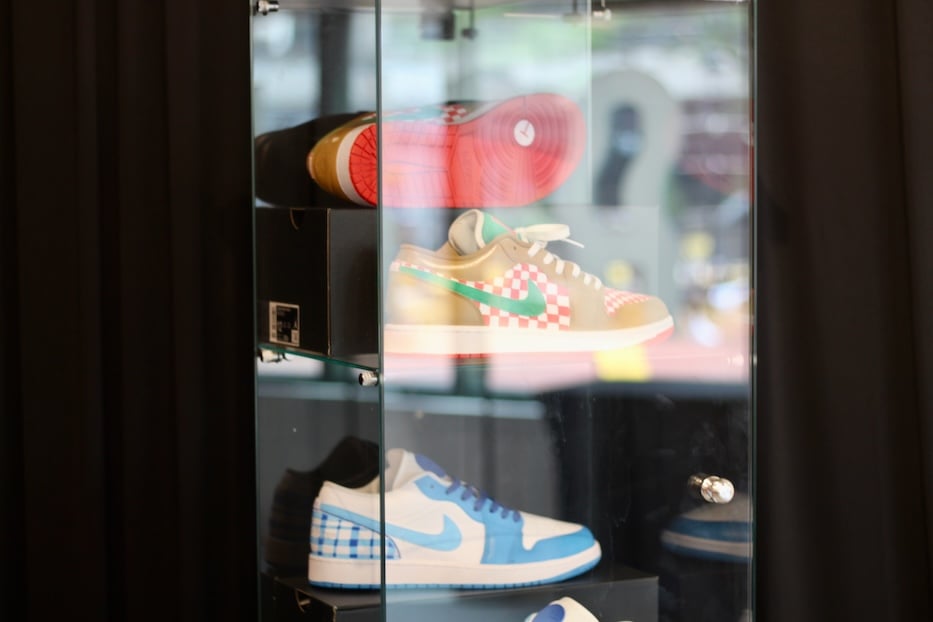
Pizza-themed Nikes, more of which Pollack is rolling out in his June 7 fashion show.
Another, from his Blue Print Series, imposes the image of a slice on a decades-old, hand drawn blueprint from New Haven’s English Station, once a coal-fired power plant on the Mill River where pizza makers ostensibly got their coal for years. There are now nine of the prints out in the world, in a nod to the Nine Squares on which the city was mapped out and built in the seventeenth century.
For Pollack, who lives over Cafe Nine, it’s part of a love letter to pizza that he’s been building for decades and hopes to grow in the coming year. As a kid, he grew up going to Sally’s with his family; he still looks upon the red pie with a sort of reverence, as does Dakoulas (who gravitates toward Pepe’s, but that’s for another article). The older he got, the more he realized that pizza could play a real role in bringing people together. And in New Haven, it was and is also a taste of home.
Now, it’s also “a way for me to shine light back” on the small businesses, restaurants and artists that make the city such a vibrant place to live and to create art, he said.
Next month, he plans to continue that work with a fashion show and installation at Tweed-New Haven Airport that centers the role of pizza in Connecticut’s long history. The first, scheduled for June 7, features a limited-edition line of “Char Jordan 9s,” or white Air Jordans that have been baked in the Modern Apizza oven until they have char on their edges. Proceeds from the event will go to the Feeding Families Foundation, with which Pollack has collaborated since last year.
“I like that people are putting the New Haven name out there,” he said. “It makes me really proud to represent my state.”